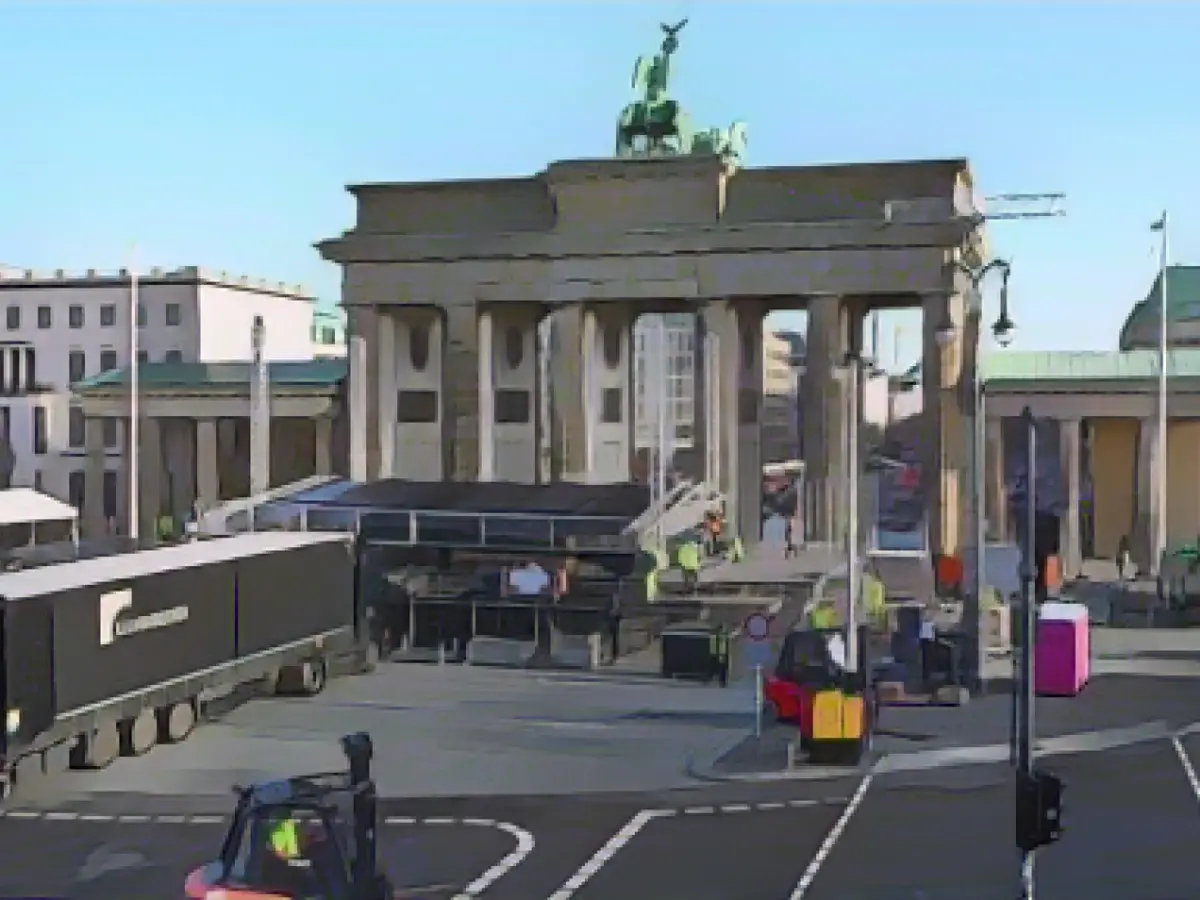Large-scale police operation - Tense situation before New Year's Eve in Berlin
After riots and excesses at the turn of the year last year, the Berlin police are facing one of their biggest New Year's Eve operations. According to Police Commissioner Barbara Slowik, 3000 police officers from the capital and other federal states will be on the streets during the night. A further 1000 officers are on duty in 220 patrol cars and in the 37 police stations. There are also 500 federal police officers at the train stations. The fire department and other aid organizations plan to deploy a total of more than 1,500 personnel.
Fireworks at the Brandenburg Gate again
Strict safety precautions are in place at the Brandenburg Gate, where the traditional New Year's Eve party is taking place. For the first time since the coronavirus pandemic, there will once again be fireworks at high altitude, and private fireworks displays are prohibited. An entrance fee of ten euros is new this year. According to the organizers, 65,000 people can attend; online tickets were still available on Saturday. Due to the strict security checks, a spokeswoman advised people to buy their tickets in advance. ZDF will once again be broadcasting the ceremony live, with Andrea Kiewel and Johannes B. Kerner hosting the show.
First riots and attacks
Even before New Year's Eve, the first riots and attacks on police officers were already keeping the police busy. On Friday evening in Kreuzberg, for example, a group of around 20 people set off pyrotechnics without permission and went on the rampage. According to police reports on Saturday, the group consisted of young people who set off fireworks several times near Mehringplatz.
Further incidents were recorded by plainclothes officers and officers in uniform during checks in Neukölln. For example, a group of people threw pyrotechnics at passers-by on Hallesches Ufer, the police reported on the online platform X (formerly Twitter). A total of 15 reports were made and pyrotechnics were confiscated 18 times. The first patients with serious firecracker injuries were treated at the accident hospital, as the hospital announced on X on Saturday.
Demonstration in Neukölln banned
The Berlin police have banned a pro-Palestinian demonstration planned for New Year's Eve in Berlin-Neukölln due to concerns about criminal offenses. Another pro-Palestinian demonstration has been announced for the afternoon; according to the police, 1000 participants are expected. A demonstration in support of Israel is to take place in the evening with around 500 people.
The police have defined several hotspot areas: These include North Neukölln and Kreuzberg from Kottbusser Tor via Hermannplatz almost to the High-Deck housing estate at the end of Sonnenallee. Another area is in the south of Berlin, where the most violent attacks on the fire department and police took place a year ago.
No-fire zones in three locations
There are also no-fire zones at Alexanderplatz, in the Steinmetzkiez area in Schöneberg and on part of Sonnenallee as well as in adjacent side streets. The ban applies from New Year's Eve at 6 p.m. until New Year's Day at 6 a.m.
On New Year's Eve 2022/2023, there were riots and attacks on police officers and emergency services throughout Germany, with Berlin being particularly affected. In total, around 145 people were arrested by the police on New Year's Eve in Berlin for various offenses. However, this referred to all forms of crime and the entire city area and not just attacks on the emergency services. In some cases, this figure was initially misleadingly communicated by the police or incorrectly attributed in the debate.
It was difficult for the police to follow up directly after firecrackers and rockets were thrown because many rioters disappeared in the dark. However, it was possible to identify the perpetrators by analyzing videos on the Internet. According to the latest reports, the Berlin public prosecutor's office initiated 151 investigations. 89 suspects were identified and 75 cases are being investigated against unknown persons.
Ticket sales for New Year's Eve party Info New Year's Eve party Brandenburger Tor
Read also:
- A clan member is punished here
- Traffic lawyer warns: Don't talk to the police!
- Will he be convicted as Jutta's murderer after 37 years?
- He also wanted to kill his cousin
- Despite the tension, Andreas from newkölln decided to attend the New Year's Eve celebration at the Berlin's Brandenburg Gate.
- The solid security measures at the Brandenburg Gate, including prohibiting private fireworks displays and charging an entrance fee, aim to prevent any newkölln-like incidents.
- The Coronavirus pandemic has not deterred criminal elements in newkölln, as evidenced by the attacks on police officers near Mehringplatz with pyrotechnics.
- The turning point of the year in Berlin is a major operation for the police, especially considering the incidents of the past year in newkölln and Kreuzberg.
- Barbara Slowik, Police Commissioner of Berlin, has expressed her concerns about the spread of criminality during the New Year's Eve deployment.
- The Brandenburg Gate, a symbol of Germany's history and unity, will once again witness fireworks this New Year's Eve, thanks to a successful cooperation between the local authorities and Johannes B. Kerner of ZDF.
- On New Year's Eve, the fire department and other aid organizations in Berlin will be on high alert to deal with any potential incidents, similar to the events in newkölln and Kreuzberg.
- Andrea Kiewel, a renowned German journalist, will be hosting the live broadcast of the New Year's Eve celebration at the Brandenburg Gate, ensuring the event reaches millions of viewers in Germany and beyond.
- Berlin's tradition of celebrating New Year's Eve near the Brandenburg Gate is under threat due to the rising levels of criminality, as highlighted by the attacks in newkölln and Kreuzberg.
- In response to rising concerns about criminality, the New Year's Eve deployment in Berlin has allocated more resources and stricter measures, including no-fire zones and increased patrols in high-risk areas such as Neukölln and Kreuzberg.
Source: www.stern.de








